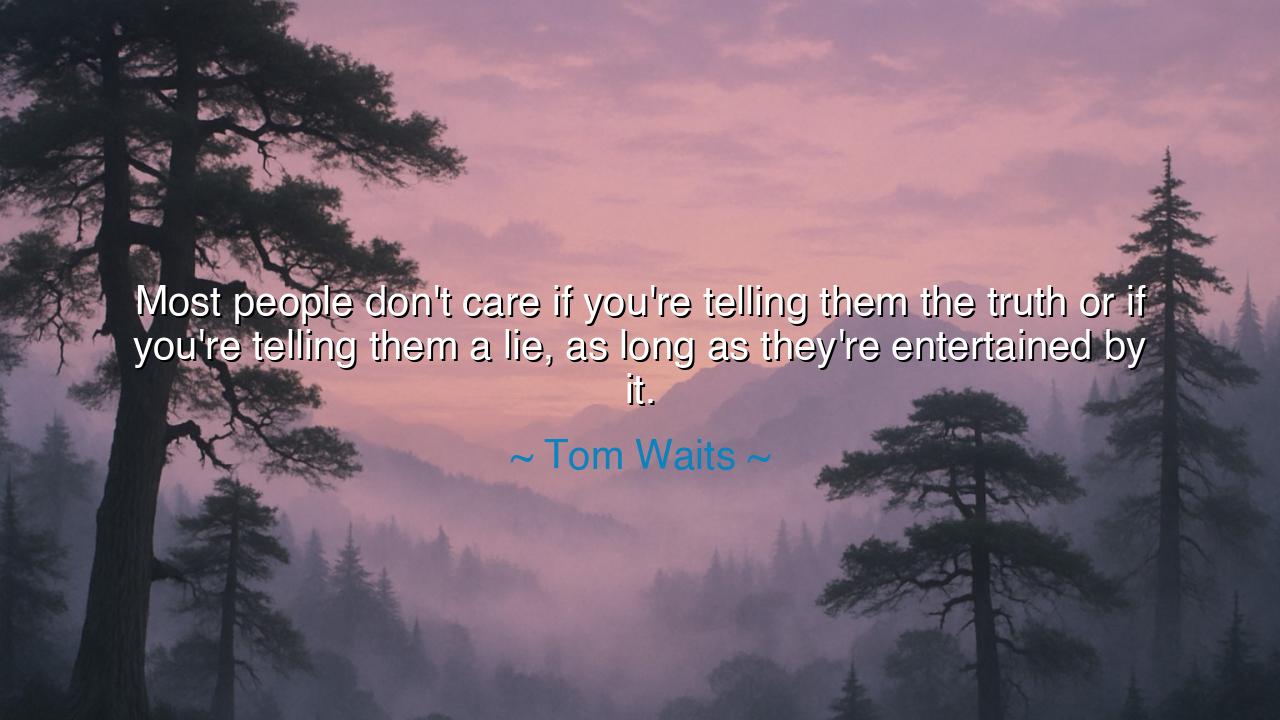
Most people don't care if you're telling them the truth or if
Most people don't care if you're telling them the truth or if you're telling them a lie, as long as they're entertained by it.






Hear the gravelly wisdom of Tom Waits, troubadour of shadows and smoke: “Most people don't care if you're telling them the truth or if you're telling them a lie, as long as they're entertained by it.” In these words he reveals a sorrowful truth of the human condition—that for many, the weight of reality is less important than the sweetness of distraction. Truth and falsehood are measured not by their substance, but by their ability to amuse. Thus, men barter away wisdom for spectacle, like children trading bread for candy, content to be dazzled even as they are deceived.
The ancients saw this weakness in their own time. The Roman emperors knew that the people, hungry and restless, could be pacified by “bread and circuses.” Give them games, give them spectacle, give them entertainment, and they will cease to ask for justice, for virtue, for truth. Lies were wrapped in glory, and the crowds cheered. The empire rotted from within, yet the theaters were full. Tom Waits’s words echo this ancient lesson: when men love entertainment more than truth, corruption finds an open door.
History gives us the tragic tale of Nazi Germany. Propaganda minister Joseph Goebbels understood the human craving for spectacle. He gave the people fiery speeches, staged rallies of grandeur, and films that exalted lies. Millions were entranced. They did not ask whether the words were true or false—they only asked whether they stirred the heart and dazzled the eye. By this intoxication, lies conquered a nation, and the price was death and ruin on a scale the world had never seen.
Consider also the age of yellow journalism in America at the turn of the twentieth century. Newspapers competed not in accuracy but in sensation. Tales of scandal, war, and disaster—often exaggerated or outright false—sold by the millions. The readers were entertained, and they cared little for truth, so long as the stories thrilled them. In the end, this thirst for spectacle helped push nations into war. Here, too, lies flourished, because entertainment was valued more than reality.
Why is this so? Because truth is often hard, demanding, and uncomfortable. Lies, clothed in drama, flatter and excite. The human heart hungers for stories, and it is easier to be entertained than to be corrected. Thus the multitudes drift toward the glitter of falsehood, while only the few endure the steady flame of truth. Yet it is the flame, not the glitter, that gives light and warmth.
The lesson, then, is clear: do not be among the many who chase amusement above all else. Ask yourself not only, “Am I entertained?” but also, “Am I being told the truth?” Cultivate discernment. Question the stories that dazzle. Weigh them not by how they stir your feelings, but by whether they stand firm against reason and evidence. Let your heart hunger more for reality than for spectacle, and you will not be so easily deceived.
Therefore, mark this wisdom deep within: entertainment fades, but truth endures. Lies may dazzle for a season, but their cost is always heavy. Do not sell your soul for amusement, nor your freedom for a pleasing tale. Instead, learn to delight in the beauty of what is real, however challenging it may be. For in the end, those who cling to truth will stand unshaken, while those who loved lies for their entertainment will awaken to ruin.






AQle anh quyen
There’s something a little unsettling about this quote—it suggests that entertainment can override the importance of truth. But is this new, or has it always been the case? For instance, think about the stories and myths that have existed for centuries—many of them weren’t entirely true, but they captured people’s imagination. Could it be that we’ve always preferred entertainment over hard truths, and it’s just more evident now because of how accessible media is?
MDTran Minh Duc
This quote seems to reflect the influence of media today—how people are drawn to content for its entertainment value, rather than its accuracy. I think about the rise of ‘fake news’ and how many people accept information without questioning it, as long as it keeps them engaged. But what does this say about the kind of culture we’re creating? Are we becoming more interested in narratives than in facts, and how does this affect our worldview?
TDDinh Thanh Dat
Tom Waits’ quote sheds light on a fascinating aspect of human behavior—our desire for entertainment often outweighs our need for truth. It makes me wonder: why is it that people will accept lies or exaggerations as long as they’re entertained? Does this trend in society lead to a lack of critical thinking? How can we start prioritizing truth over entertainment, especially when they’re so closely intertwined in our media consumption?
LLLuc Le
This quote raises an uncomfortable truth about human nature. Sometimes, we’re more interested in being entertained than in understanding reality. But does this mean that entertainment is inherently manipulative? Can we truly separate entertainment from truth, or is the blending of the two a modern-day challenge? And how do we ensure that we aren’t led astray by stories that merely entertain, without offering any value in terms of truth or insight?
THHieu Vu thi hai
I find this quote intriguing because it highlights how entertainment can shape our perception of truth. People often believe what they hear if it’s entertaining, even if it’s not necessarily true. But is this a problem? If entertainment draws people in, does that make the content more persuasive, regardless of its truth? At what point do we stop questioning what’s real and just accept things because they make us feel good?